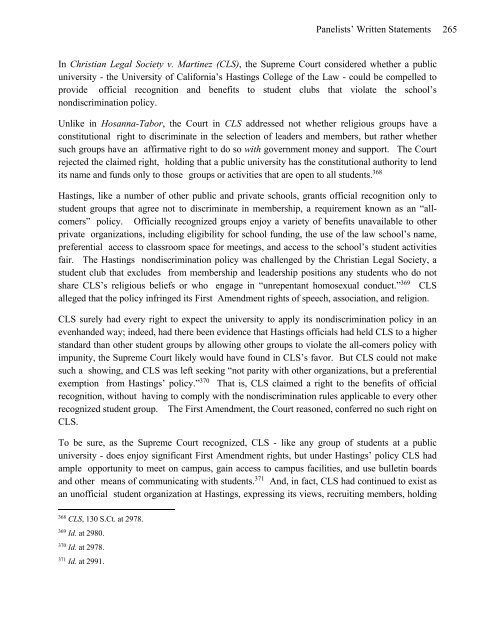PEACEFUL COEXISTENCE
2cgDkdT
2cgDkdT
Create successful ePaper yourself
Turn your PDF publications into a flip-book with our unique Google optimized e-Paper software.
Panelists’ Written Statements<br />
267<br />
It also secures equal rights and opportunities for its students. As the Court recognized, polices<br />
like the one challenged in CLS “ensure [] that no Hastings student is forced to fund a group that<br />
would reject her as a member.” 378<br />
While the Hastings policy requires recognized groups to admit “all comers,” some other colleges<br />
and universities have more traditional nondiscrimination policies that prohibit recognized groups<br />
from denying membership based on a list of protected characteristics such as race, sex, religion,<br />
sexual orientation, gender identity, disability, or veteran status. Although the CLS case<br />
expressly addressed only the Hastings all-comers policy, the decision suggests that the traditional<br />
nondiscrimination policies should readily pass constitutional scrutiny, as well. As Justice<br />
Stevens noted in his concurrence, such a policy, like the all-comers policy, is “plainly legitimate”:<br />
It is “content and viewpoint neutral,” restricting official recognition on the basis of student<br />
groups’ conduct, not “on the basis of their convictions.” 379<br />
In fact, in Alpha Delta Chi-Delta Chapter v. Reed, 380 the only post-CLS decision to address the<br />
issue, the U.S. Court of Appeals for the Ninth Circuit upheld San Diego State University’s<br />
traditional nondiscrimination policy. 381 A Christian fraternity and sorority challenged that<br />
policy, which conditions funding and various other benefits on student groups’ agreement not to<br />
discriminate on the basis of race, religion, national origin, ethnicity, color, age, gender, marital<br />
status, citizenship, sexual orientation, or disability. Closely following the Supreme Court’s<br />
reasoning in CLS and finding no material difference between an all-comers policy and a more<br />
traditional one, the court of appeals in Alpha Delta Chi rejected the plaintiffs’ First Amendment<br />
claims. That the challenged policy incidentally burdens some groups more than others, the<br />
court held, is of no moment: “San Diego State’s nondiscrimination policy does not ‘target<br />
speech or discriminate on the basis of its content,’ but instead serves to remove access barriers<br />
imposed against groups that have historically been excluded.” 382 And, as in CLS, San Diego<br />
State’s policy did not require student organizations to accept unwanted members and leaders, but<br />
merely conditioned school benefits on the agreement not to discriminate. Echoing the Supreme<br />
Court, the court of appeals concluded, “Plaintiffs are free to express any message they wish, and<br />
may include or exclude members on whatever basis they like; they simply cannot oblige the<br />
university to subsidize them as they do so.” 383<br />
378<br />
CLS, 130 S.Ct. at 2989.<br />
379<br />
Id. at 2996 (Stevens, J., concurring).<br />
380<br />
648 F.3d 790 (9th Cir. 2011).<br />
381<br />
Although the court of appeals rejected a facial challenge to the policy, it remanded the case to the district court to<br />
determine whether, in practice, the university had selectively enforced the policy against the plaintiffs. Id. at 803-04.<br />
382<br />
Id. at 801.<br />
383<br />
Id. at 803.


